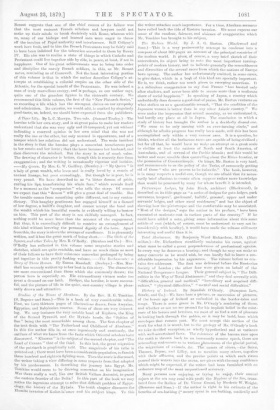The. Modern, World. By J. A. G. Barton. (Blackwood and
Sons.)--This is a very praiseworthy attempt to condense into a compass of about 300 pages an account of the principal countries of
the modern world. it gives, of course, a very brief sketch of their antecedents, its object being to note the most important turning- points of modern history, and to indicate generally the resemblances and diversities of the several races from which the nations of Europe have sprung. The author has unfortunately omitted, in some cases, to give dates, which in a book of this kind are specially important.
Ho is, we think, rather too much given to sweeping assertions. It is a ridiculous exaggeration to say that Franco "has hunted only after shadows, and never been able to secure more than a moderate share of social happiness." In speaking of Japan, a country which undoubtedly does deserve a good deal of praise, Mr. Barton ventures on what strikes us as a questionable remark, "That the condition of the Japanese women is better than in any other Asiatic country." We were under the impression that sexual morality, as we understand it, had hardly any place at all in Japan. The conclusion to which a study of history has brought the author is a decidedly dismal one. " We seem to be only turning with an ever-turning circle," and although he admits progress has really been made, still this has been accomplished only within ft very narrow area. It is a question, he thinks, whether all the barbarous races are capable of being civilised ; but for all that, he would have us make an attempt on a great scale to civilise at least the nations of North and South America, of Australasia, and of several of the Pacific islands; and this would be
better and more sensible than quarrelling about the Rhine frontier, or the possession of Constantinople. On kings, Mr. Barton is very hard, and recommends to us the policy of the Turks, of summarily getting
rid of those " who are proven to be imbecile." The book, however, is in many respects a useful one, though we are afraid that its nocee- sarily brief allusions to events often suppose rather more knowledge than would be possessed by many for whose benefit it is intended.






























 Previous page
Previous page